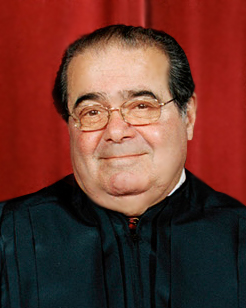Antonin Scalia was confirmed in 1986 by a 98-0 vote by a Republican majority (narrow, 53-47) Senate. He had by then established himself as a staunch supporter of presidential executive privilege under President Ford and was expected to be the Solicitor General of the US under President Reagan but was passed over. A devout Catholic with nine children, Scalia often presented an exceptionally astute rationale for his positions, which when combined with his caustic wit often glossed over or excused his rather overt dedication to conservatism—or strict originalism as he was often credited with. Whatever one might have thought of his rationale, even his most ardent critics acknowledged his judicial intellect. His disdain for his fellow colleagues became increasingly apparent with age, and terms like 'jiggery-pokery' became popular in pop culture.
While many may recall his stinging dissents or his opinions citing originalism, I would pick a case in which he was the sole dissenter, as the focus of this post. Morrison v. Olson which was decided in 1988.
Morrison established as constitutional the Office of the Independent Counsel. Independent counsels had been provisioned a decade earlier under the Ethics in Government Act of 1978 largely as a response to the Watergate scandal and the Saturday Night Massacre featuring Robert Bork. And Nixon. The Independent Counsel (IC) was to be appointed by a special panel of the US Court of Appeals for the DC circuit, and could investigate any malfeasance without intervention against any member of the three branches of government. The IC would have an unlimited budget and would not be subjected to deadlines. Morrison itself had bubbled up when the authority of the IC was challenged on constitutionality. President Reagan had thwarted Congress from demanding documentation from the EPA citing executive privilege, and Olson who worked as an assistant AG on the Office of Legal Counsel was being targeted for possible perjury. A Democratic House Judiciary Committee has sought the appointment of an IC to investigate Olson.
The constitutionality of the IC was challenged and eventually ruled constitutional by the SCOTUS. Scalia's dissenting rationale? That the IC would essentially create a fourth branch of government one that could not be thwarted, challenged, or subject to oversight from any of the other three. His warning was rather blunt:
"By its shortsighted action today, I fear the Court has permanently encumbered the Republic with an institution that will do it great harm."Prescience was to be seen in its full glory a decade later when Kenneth Starr investigated Bill Clinton over Whitewater—an effort ultimately led to his impeachment. $40 million was spent over four years and Starr had altered course from his mission of investigating the Clinton land deals and expanded the probe to cover the Monica Lewinsky scandal and the death of Vincent Foster. This was the Democrats' moment of agreement with Scalia. The Republicans had found agreement with him earlier in the decade when Caspar Weinberger was found guilty on charges of perjury related to the Iran-Contra affair.
Thanks to Scalia's view being accepted, the office of the IC was finally allowed to expire in June 1999.
Any of you who remembered this about the '80s, would you agree with any of Scalia's other dissents more?

No comments:
Post a Comment